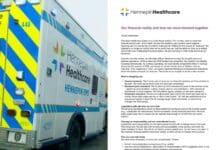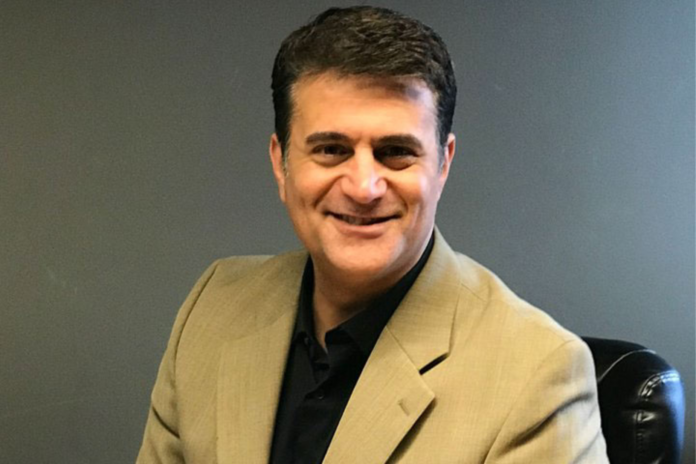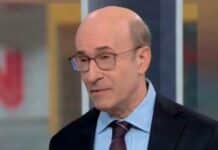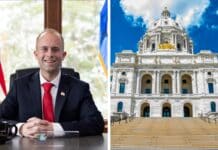Editor’s Note: Suffering Minnesota business owners face urgency to re-open our economy, to put furloughed employees back to work and resume serving the public. Well over half a million Minnesotans are unemployed. Minnesota’s economy is in gridlock, killing jobs that had been growing at a vigorous clip in the most dynamic economy ever. Only work produces the lifeblood that is cash flow. Concerned citizens staging demonstrations at the governor’s residence demand clarity and a plan from Governor Walz. Many want to see lifted the broad shelter-at-home order he has imposed on the state. This article is first in a series of business owner reports on returning to business.
___________________________________________
Gemini Athletic Wear in Edina has produced athletic jerseys for 25 years. The company serves professional and amateur teams in the U.S. and Canada.
Owner Chris Bonvino employs 11 full-time and 45 part-time workers in a spacious industrial plant. Regular production of athletic gear ceased with the governor’s mandate. March 13 was the last day making jerseys. Wishing to help alleviate shortages of critical safety gear needed by first responders in hospitals and elsewhere, he adapted quickly to embrace change.
“After navigating an excruciatingly difficult approval process, we were proclaimed an essential sector business in the state of Minnesota.” The status change permitted him to pivot production to desperately needed medical masks and gowns.
“Aside from the PPE products we’ve made, we have had no output.”
“We are open only as an essential sector business making PPE (personal protective equipment). We’re splitting our employees in shifts, cutting masks, communicating orders, and securing supplies. We’ve produced roughly 60,000 medical masks since we started.”
Their masks have benefitted users in private home-care nursing programs, Minneapolis and Saint Paul Children’s Hospital, the University of Texas Houston, Augsburg College, The Saint Paul Police and Fire Departments, and the City of Minneapolis, and others. The PPE work generated nominal cash flow but the company’s revenues lag last year’s receipts.
Adaptation is the order of the day in the conduct of business. “Most of our business is now done via the phone and the internet.”
As with many sectors, annual business gatherings that yield orders and drive business cash flow have been canceled, a casualty of the Coronavirus scare signaling that economic challenges lie ahead.
“Our biggest trade show has been canceled.
“We’re preparing for our re-opening when they let us get back to work,” Bonvino said, noting that his operation easily can incorporate social distancing for his workers.
“With a few safety mandates, we can get back to work next week. For employees who are high risk, or who don’t want to work because they’re still uncomfortable, we’ve offered to pay them for an additional week.” Those who do not return may go on unemployment, he said.
“Re-opening is extremely urgent for me, and hopefully as urgent for my employees,” Bonvino said.
Under the mandated shutdown the Bonvino family is operating under a double whammy. Chris’s wife, Trudy, is an orthodontist running a practice, Cosmopolitan Orthodontics, that serves approximately 1,000 families through three offices. The hands-on nature of orthodontics raises the bar much higher for Trudy and her team and return to work becomes ever more urgent with the passing of time.
“All patients are in active, ongoing treatment… that should be attended to every eight to ten weeks.” Daily, calls are increasing. Sometimes, something comes loose through usage and when that happens people need help.
“We have a commitment to take care of these patients.”
Trudy hopes that regulations being formulated for return to service by the governor’s office recognize varied circumstances in specific dental specialty areas. Though general dentistry and orthodontics both are close contact services, practices and risks of orthodontics services vary widely from general dentistry, she said. Notably, the use of high-speed hand pieces that create aerosols are more widely used in general dentistry.
Looking ahead to re-opening, she cites new safety regulations that will completely alter for patients the friendly family-style practice that has characterized her practice to date. Video games, coffee bars, and other amenities now deemed risky will be gone. Nine costly surgical clean air machines are being installed “to make it safe for our patients and for our team.”
Trudy and her team members also are visibly different than in the past. The former mode of dress, colorful scrubs, and tennis shoes, will be replaced by more austere garb.
The new recommendations call for an N95 surgical face mask to protect from airborne particles and liquid contaminating the face, a second mask to protect the N95, a full-face shield, goggles, gloves, and an isolation gown for any aerosol-producing procedure.
Given the scheduled timing of appointments that have been and are being deferred, service needs are accruing. Social distancing will introduce changes to her patient service areas.
“When we re-open, we will be serving fewer people in our office at any given time. There will be 12-hour days and split shifts by the clinical team in order for us to catch up.”
Uncertainty underlies all as Minnesota awaits clarity from the governor.
“We’re trying to identify (orthodontics) as a separate entity (from general dentistry). Hopefully, (Governor Tim Walz) will consider the question profession by profession. It’s a matter of how you control (safety factors) in your specific environment.
“Our association has got to get out in front of this. We want to make sure people are comfortable coming back into our offices,” Trudy said.
“We just want to get back to work and take care of our patients safely.”











